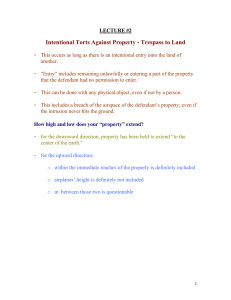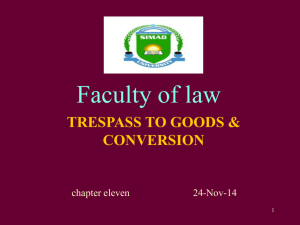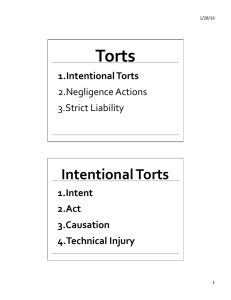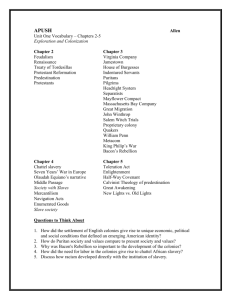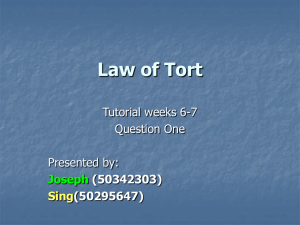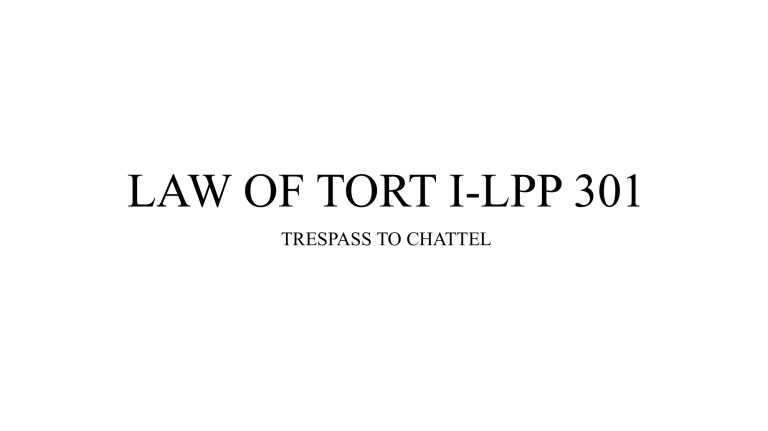
LAW OF TORT I-LPP 301 TRESPASS TO CHATTEL Trespass to Chattels • Trespass to Chattel is divided into three types of torts namely, trespass to Chattel per se; Conversion and; Detinue • These three forms are actionable per se without the plaintiff having to prove damage • There are however circumstances where the plaintiff has to prove it in order to recover damage TRESPASS TO CHATTELS Trespass to Chattel is also known as Trespass to Goods • What is a Chattel? • Chattels can be described as items of personal property that can be identified and are movable • Examples are books, furniture, cars, clothes, etc. Everything capable of being moved can be a chattel • When a person moves out of his house, the items he takes are chattel • A thing that a person can possess in physical form; a tangible movable asset, for instance, a piece of jewellery, a painting, equipment or machinery can be described as a chattel Contd. • The tort is defined as a direct and wrongful interference with a chattel in the possession of the plaintiff, such interference being either intentional, which is the normal case or just negligent • It is a wrong against possession • The purpose of the Tort of trespass to Chattel is to protect the possessor of a chattel from wrongful interference without lawful justification Contd. • The law protects the interest of the plaintiff in the following instances: • Interest in retaining possession of the chattel • Interest in the protection and physical condition of the chattel • Interest in protecting the chattel against meddling Acts of trespass • Trespass to chattels may take various forms such as destroying, damaging or merely using goods or wrongfully moving them from one place to another. • See the classical case of Davies v. Lagos City Council • The tort of trespass to chattel states that either intention or negligence must be established. Contd. • Trespass to chattels is actionable per se, that is, without proof of actual damage. Thus the mere wrongful moving or touching of a chattel without causing any harm is actionable • It is no defence in an action for trespass to chattels that the tort was committed when carrying out the instruction of the executive arm of government as distinct from judicial act. Ajao v. Ashiru • The tort is designed to protect possession. To succeed in an action for trespass, the plaintiff must show that he had possession at the time of the trespass or is entitled to immediate possession of the chattel. Contd. • An owner, a borrower or a hirer may maintain an action against any person who wrongfully interferes with the goods • A person, who has wrongfully acquired possession may maintain action against all persons except the owner or agent of the owner of chattel • Difference between accidental trespass and trespass by mistake Examples of Trespass to Chattel • Taking a chattel away • Merely moving of the goods from one place to another • Killing another person’s animal, feeding trespass to it or beating it • Scratching or making marks on the body of the chattel. For e.g. making marks on a parked car • Driving another person’s car without permission • Throwing objects at the chattel, etc Protection of Possession • Trespass to chattel has similarities with trespass to land in relation to the protection of possession • The plaintiff must have had actual possession at the time of the interference with the defendant • Principles guiding trespass to chattel are divided into three Conversion • Definition of Conversion • This is the dealing which denies a person of the title, possession, or use of his chattel • It is the intentional dealing with or exercise of control over a chattel which interferes with the plaintiff’s possession or right to possession of such chattel • Distinguishing conversion from trespass • Intention must be present under Conversion Acts of Conversion • Conversion by taking • Conversion by destruction, consumption or alteration • Conversion by using • Conversion by receiving • Conversion by wrongful transfer of title or possession • Conversion by detention • Conversion of negotiable and other instruments Persons who may sue for conversion • Owners, Bailees, holders of lien and pledge, finders, buyers, assignees, licensees and trustees • Defences for Conversion of a Chattel • The defendant may plead: • Jus tertii; subsisting bailment; subsisting lien; temporary retention limitation of time Remedies for Conversion • Order for delivery, return or specific restitution of the goods; • Payment of the current market value of the chattel; • Recovery of special and general damages; Detinue • This is the claim for the specific return, delivery, or surrender of a chattel to the plaintiff who is entitled to it. • It is the wrongful detention or retention of a chattel whereby the person entitled to it is denied the possession or use of it. • Even though its feature is similar to conversion by detention but nonetheless, there are differences Differences between Detinue and Conversion 1. The defendant will not be liable for conversion by detention where prior to the demand for their return by the plaintiff, the goods have been lost or destroyed, either by accident or by the negligence of the defendant. The defendant will however be liable in detinue in such instances unless he can prove that the goods were not lost or destroyed through his negligence. Hence, liability has been said to be stricter than that of conversion by detention. 2. Refusal to surrender on demand is the essence of detinue but it is only one of several forms of conversion. 3. The plaintiff can claim specific restitution of the goods in detinue but he cannot do so in conversion. Contd. • Damages are generally assessed in conversion on the value of the goods at the date of the conversion, whereas in detinue, they are assessed on the value of the goods at the date of the trial. If the value of the chattel has increased between the date of the refusal to surrender and the date of the trial, the plaintiff should sue in detinue, but if there has been a decrease in value during the period, he should sue in conversion. • An example of a successful action in detinue is Udechukwu v. Okwuka. Defences for Detinue • A defendant may plead the following: • Mere possession of the goods • That the plaintiff has insufficient title as compared to himself • The defendant may plead jus tertii, which is that a third party has a better title, so long as the defendant is the agent, or has the authority of the third party, or that he is claiming under the third party • Innocent delivery • Subsisting lien on the chattel, etc. Remedies for Detinue • The person who is denied possession or use of such chattel has various remedies that are open to him. They include: • Claim for return of the Chattel • Replacement of the Chattel • Claim for the market value of Chattel • Recapture or self-help • Replevin or Release on Bond • Damages
